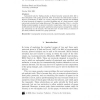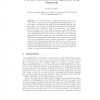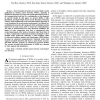104 search results - page 14 / 21 » Modeling Key Compromise Impersonation Attacks on Group Key E... |
JAR
2006
13 years 8 months ago
2006
Automated tools for finding attacks on flawed security protocols often fail to quately with group protocols. This is because the abstractions made to improve performance on fixed ...
SEC
2001
13 years 10 months ago
2001
: The Cliques protocols are extensions of the Diffie-Hellman key exchange protocol to a group setting. In this paper, we are analysing the A-GDH.2 suite that is intended to allow a...
EUROCRYPT
2009
Springer
14 years 9 months ago
2009
Springer
A group key agreement (GKA) protocol allows a set of users to establish a common secret via open networks. Observing that a major goal of GKAs for most applications is to establish...
ISW
2004
Springer
14 years 1 months ago
2004
Springer
Due to the low entropy of human-memorable passwords, it is not easy to conduct password authenticated key agreement in a secure manner. Though there are many protocols achieving th...
TWC
2008
13 years 8 months ago
2008
Event boundary detection is in and of itself a useful application in wireless sensor networks (WSNs). Typically, it includes the detection of a large-scale spatial phenomenon such ...



